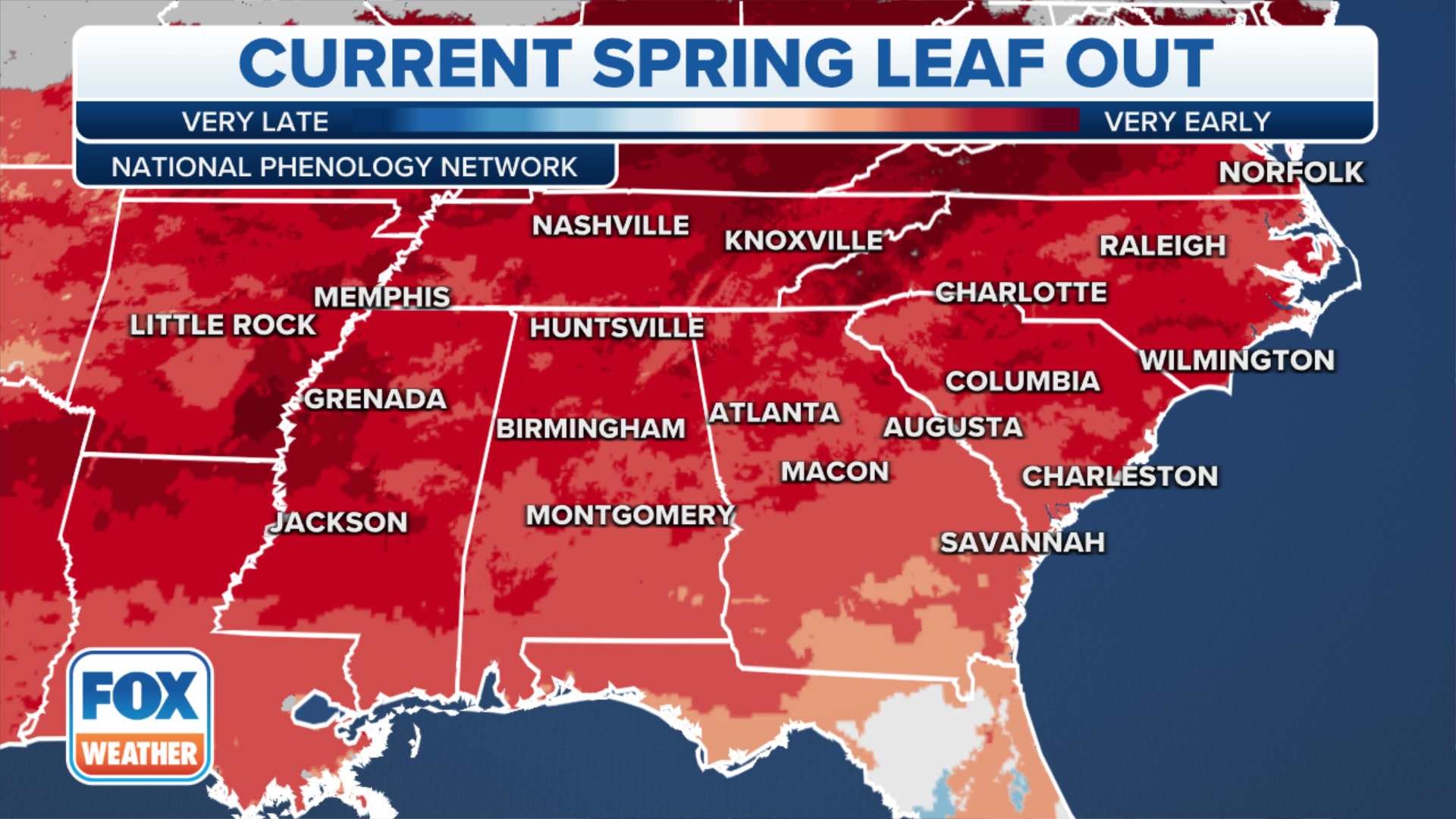Protect your plants: Spring flowers to be impacted by upcoming March cold snaps
Some communities could reach 10 to 20 degrees below average courtesy of unusually stout cold fronts that will make their way across the Southeast over the next few weeks. Most of the Southeast is usually out of freeze season in March, meaning some plants could face hardship from the late-season cold weather outbreaks.
Cold front sweeping across US will make temperatures below-average through weekend
A cold front, associated with the cross-country storm, will sweep across the country late this week. This will send temperatures downward, with highs expected to be 10-20 degrees below-average for a vast majority of the Central and Eastern U.S.
Spring has been in the air for many weeks in large regions of the East, where flowers are in bloom and new leaves have already grown out, but a late-season cold snap threatens to halt the springtime beauty.
"Next week, we're talking about the first day of the astronomical spring, but unfortunately, Old Man Winter is going to be making its way to the South," FOX Weather meteorologist Jason Frazer said.
A series of cold fronts that started impacting the region this week and are expected to continue through Sunday. This will send temperatures downward, with highs expected to be 10 to 20 degrees below average for a vast majority of the central and eastern U.S.

A cold front, associated with a cross-country storm, will sweep across the country late this week.
(FOX Weather)
Dozens of locations in the South and East saw one of their warmest Februarys on record, prompting early spring blooms in many areas. With the addition of recent freezes earlier this week, recently sprouted vegetation will be at risk.
"All of this coming as many of the plants as well as the trees have already started to bloom here, because in the past couple of weeks, we've actually seen above-average temperature," Frazer said.
The USA National Phenology Network has tracked the progress of spring’s annual leaf-out process for more than a decade and said the 2023 blooming season arrived days or even weeks early in many regions. The spring bloom was some 22 days early in Norfolk, Virginia, and even 21 days earlier than average in Nashville, Tennessee.

(FOX Weather)
In some of these same regions, frost and freeze alerts are in effect, and plants may be vulnerable to the unusually chilly air.
WHAT SEASON DO FRUITS AND VEGETABLES GROW IN?
The FOX Forecast Center expects temperatures to drop below the freezing mark in Atlanta, Charlotte, Raleigh and many other communities that are getting close to their last average freeze date.
Specialists at the USA National Phenology Network say to pay close attention to the 28-degree benchmark, which is considered to be the threshold between a freeze and a hard freeze.
If not protected from the cold weather, a hard freeze can significantly damage plants considered vulnerable and not hardy.
According to Erin Posthumus, an outreach Coordinator at the USA National Phenology Network, the water inside plant cells can freeze, causing them to expand and rupture. Damage is usually irreversible, and plants will lose their leaves or flowers.
Typically, a plant will not produce flowers for a second time, so if blooms are killed or damaged, there may be a few gardens without the aesthetically pleasing sight of colored flowers later in the spring.
Experts say plants that survive the cold snap will recover, but it could take an extended period of time, which means leaf-out processes and pollen seasons will slow compared to the brisk start to the year.
WHEN IS THE LAST FREEZE IN MY AREA?
Before plants are exposed to the extreme cold, experts at the University of Florida say there are steps you can take to minimize exposure and damage.
The most popular method to protect plants is with a blanket or sheet. This can be easily done before temperatures reach critical levels, but experts remind gardeners not to use plastic coverings.
Plastic coverings can actually harm plants and make them more susceptible to cold.
Two other suggested methods include watering the plants and adding mulch above the roots. Mulch can help protect the ground from heat loss.

A woman walks by snowdrops in bloom at St Nicholas' Park in Warwick. Picture date: Tuesday January 31, 2023.
(Jacob King/PA Images / Getty Images)
